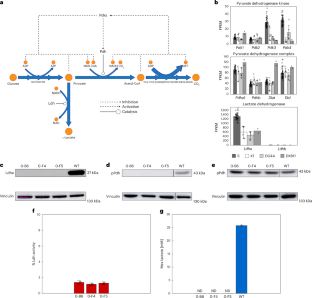多重基因组编辑在不影响哺乳动物细胞生长速率的情况下消除了乳酸的产生
IF 18.9
1区 医学
Q1 ENDOCRINOLOGY & METABOLISM
引用次数: 0
摘要
Warburg效应描述了即使在氧气存在的情况下葡萄糖发酵成乳酸的过程,这种效应在包括癌细胞在内的增殖性哺乳动物细胞中普遍存在,但由于乳酸积累会抑制细胞生长和蛋白质产生,因此对生物制药生产提出了挑战。由于乳酸脱氢酶是细胞生长所必需的,以前试图消除细胞中乳酸生成以进行生物处理的努力失败了。在这里,我们通过同时敲除乳酸脱氢酶和丙酮酸脱氢酶激酶,有效地消除了中国仓鼠卵巢和人胚胎肾细胞系HEK293中乳酸的产生,从而消除了通常抑制丙酮酸转化为乙酰辅酶a的负反馈回路。这些细胞,我们称之为Warburg-null细胞,在维持野生型生长速率的同时产生可忽略不计的乳酸,表现出氧气消耗的代偿性增加,几乎完全依赖于氧化代谢,并且在分批喂料细胞培养中细胞密度更高。Warburg-null细胞仍然适用于生产各种生物治疗蛋白,达到工业相关的滴度并维持产物糖基化。消除乳酸产生的能力可能对生物治疗生产有用,并为研究常见的代谢现象提供了工具。本文章由计算机程序翻译,如有差异,请以英文原文为准。


Multiplex genome editing eliminates lactate production without impacting growth rate in mammalian cells
The Warburg effect, which describes the fermentation of glucose to lactate even in the presence of oxygen, is ubiquitous in proliferative mammalian cells, including cancer cells, but poses challenges for biopharmaceutical production as lactate accumulation inhibits cell growth and protein production. Previous efforts to eliminate lactate production in cells for bioprocessing have failed as lactate dehydrogenase is essential for cell growth. Here, we effectively eliminate lactate production in Chinese hamster ovary and in the human embryonic kidney cell line HEK293 by simultaneous knockout of lactate dehydrogenases and pyruvate dehydrogenase kinases, thereby removing a negative feedback loop that typically inhibits pyruvate conversion to acetyl-CoA. These cells, which we refer to as Warburg-null cells, maintain wild-type growth rates while producing negligible lactate, show a compensatory increase in oxygen consumption, near total reliance on oxidative metabolism, and higher cell densities in fed-batch cell culture. Warburg-null cells remain amenable for production of diverse biotherapeutic proteins, reaching industrially relevant titres and maintaining product glycosylation. The ability to eliminate lactate production may be useful for biotherapeutic production and provides a tool for investigating a common metabolic phenomenon. Hefzi et al. engineer cells to nearly eliminate lactate production and increase mitochondrial use of pyruvate by deleting both lactate dehydrogenases and pyruvate dehydrogenase kinases with the goal of circumventing pH and osmolarity issues that arise in bioreactor-based production of biopharmaceuticals.
求助全文
通过发布文献求助,成功后即可免费获取论文全文。
去求助
来源期刊

Nature metabolism
ENDOCRINOLOGY & METABOLISM-
CiteScore
27.50
自引率
2.40%
发文量
170
期刊介绍:
Nature Metabolism is a peer-reviewed scientific journal that covers a broad range of topics in metabolism research. It aims to advance the understanding of metabolic and homeostatic processes at a cellular and physiological level. The journal publishes research from various fields, including fundamental cell biology, basic biomedical and translational research, and integrative physiology. It focuses on how cellular metabolism affects cellular function, the physiology and homeostasis of organs and tissues, and the regulation of organismal energy homeostasis. It also investigates the molecular pathophysiology of metabolic diseases such as diabetes and obesity, as well as their treatment. Nature Metabolism follows the standards of other Nature-branded journals, with a dedicated team of professional editors, rigorous peer-review process, high standards of copy-editing and production, swift publication, and editorial independence. The journal has a high impact factor, has a certain influence in the international area, and is deeply concerned and cited by the majority of scholars.
 求助内容:
求助内容: 应助结果提醒方式:
应助结果提醒方式:


